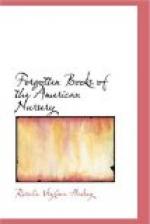Of the poetry written in America for children before eighteen hundred and forty there is little that need be said. Much of it was entirely religious in character and most of it was colorless and dreary stuff. The “Child’s Gem” of eighteen hundred and thirty-eight, considered a treasury of precious verse by one reviewer, and issued in embossed morocco binding, was characteristic of many contemporary poems, in which nature was forced to exude precepts of virtue and industry. The following stanzas are no exception to the general tone of the contents of practically every book entitled “Poetry for Children:”
“‘Be good, little Edmund,’
your mother will say,
She will whisper it soft in
your ear,
And often repeat it, by night
and by day
That you may not forget it,
my dear.
“And the ant at its work,
and the flower-loving bee
And the sweet little bird
in the wood
As it warbles its song, from
its nest in the tree,
Seems to say, ‘little
Eddy be good.’”
The change in the character of the children’s books written by Americans had begun to be seriously noticed in England. Although there were still many importations (such as the series written by Mrs. Sherwood), there was some inclination to resent the stocking of American booksellers’ shelves by the work of local talent, much to the detriment of English publishers’ pockets. The literary critics took up the subject, and thought themselves justified in disparaging many of the American books which found also ready sale on English book-counters. The religious books underwent scathing criticism, possibly not undeserved, except that the English productions of the same order and time make it now appear that it was but the pot calling the kettle black. Almost as much fault was found with the story-books. It apparently mattered little that the tables were now turned and British publishers were pirating American tales as freely and successfully as Thomas and Philadelphia printers had in former years made use of Newbery’s, and Darton and Harvey’s, juvenile novelties in book ware.
In the “Quarterly Review” of 1843, in an article entitled “Books for Children,” the writer found much cause for complaint in regard to stories then all too conspicuous in bookshops in England. “The same egregious mistakes,” said the critic, “as to the nature of a child’s understanding—the same explanations, which are all but indelicate, and always profane—seem to pervade all these American mentors; and of a number by Peter Parley, Abbott, Todd, &c., it matters little which we take up.” “Under the name of Peter Parley,” continued the disgruntled gentleman, after finding only malicious evil in poor Mr. Todd’s efforts to explain religious doctrines, “such a number of juvenile school-books are current—some greatly altered from the originals and many more by adopters of Mr. Goodrich’s pseudonym—that it becomes difficult to measure the merits or demerits of the said magnus parens, Goodrich.” Liberal quotations followed from “Peter Parley’s Farewell,” which was censured as palling to the mind of those familiar with the English sources from which the facts had been irreverently culled.




